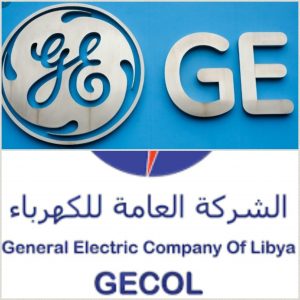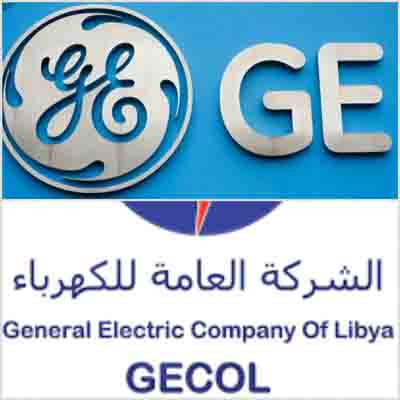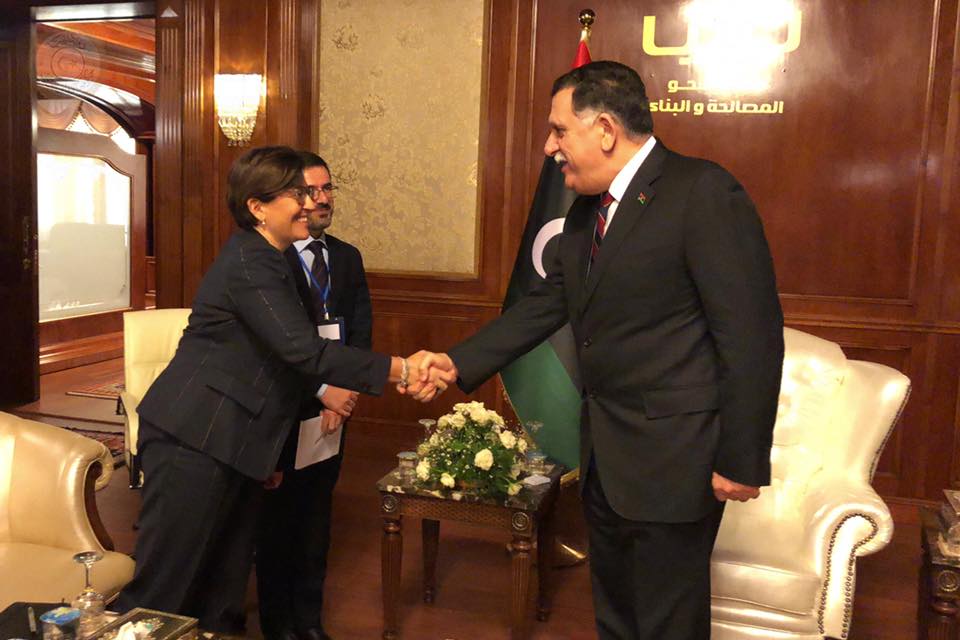By Sami Zaptia.

London, 25 July 2018:
The Faiez Serraj-led Libyan Presidency Council issued a decree (1060/2017) yesterday (dated 16 July) authorizing the state-owned General Electricity Company of Libya (GECOL) to ‘‘contract directly’’ with the General Electric Company (GE) of the United States.
The contract is worth Euro 33.3 million with 25 percent (Euro 8.3 m) to be paid in advance. The contract is for GE to supervise the execution of the dismantling and installation and technical works, the supply of special equipment required for the maintenance and development of gas units at generation stations.
A ‘‘direct contract’’ means GE did not have to engage in a secret tender process.
On a wider note, confirming the GE direct contract yesterday at the weekly press conference, Faiez Serraj’s personal spokesperson, Mohamed El Sallak, said that in addition to the GE contract, procedures for completing the other electricity projects suspended through the Jihad fund, and suspended through the lack of disbursement by the Presidency Council of GECOL’s budget allotments, were negotiated with the German company (assumed to be Siemens) and the Turkish company (presumed to be Enka Teknik) to resume work with the GECOL.
Sallak gave no further information on the stalled Siemens and Enka electricity contracts.
It will be recalled that the Presidency Council had agreed contracts for electricity projects in December 2017 for generating 2,000 megawatts of power. However, early this month it was forced to announce that these contracts were now on hold due to the Presidency Council’s inability to organize funding.
The fast-tracked projects in Tripoli West, Tripoli East and Misrata power stations were intended to overcome Libya’s 1,500 MW generation deficit which has been causing acute powers cuts across the country more or less since the 2011 revolution.
The projects were slated to be financed by the Libyan Local Investment & Development Fund (LLIDF), however, Sallak said that the Audit Bureau objected ‘‘in their view’’ to the financing of these projects on ‘‘legal’’ grounds.
He implied that the PC did not agree with the Audit Bureau’s interpretation and Sellak had added that Serraj had requested that both Audit Bureau and PC/GNA officials sit down and find an agreeable legal formula for the completion of the projects as they are important in resolving the electricity crisis that Libyan citizen are suffering from.
However, it seems that no agreeable legal formula has been found and the GE contract may be a short-term fix.
In April this year the Libya Electricity Sector Reform Task Force and GECOL held their first meeting in Tunis with US embassy and USAID officials.
The Task Force is charged with the development of strategic policy, regulatory and operational measures to support a sustainable Libyan electricity sector.
In the short-term, the Task Force will focus on the adaptation and recommendation of a clear GECOL-developed electricity sector policy which is based on international best-practice for electricity sector utilities, and the introduction of an independent regulatory authority for the electricity sector.
Through this Task Force, the Presidency Council is taking important steps to reduce waste and provide more access to electricity for all the Libyan people. U.S. assistance to Libya’s electricity sector is a response to a request from the Presidency Council to help identify causes of an ongoing electricity supply crisis in Libya and to recommend strategic actions to alleviate that crisis.
The U.S. Government is making expert advice available to support the work of the Electricity Sector Reform Task Force as it seeks to improve reliable electricity to the people of Libya.
The U.S. Agency for International Development (USAID) is helping GECOL consider best practices of well-run international electric utilities and providing technical assistance to help implement specific activities.
USAID will conduct workshops for GECOL staff, and other electricity sector stakeholders, highlighting best-practices in commercial loss reduction, energy conservation and revenue enhancement. With USAID assistance, GECOL developed the Electricity Sector Reform Roadmap in 2017.
It will also be recalled that on 7 August last year GECOL and German energy company Siemens signed an MoU in Germany that was supposed to pave the way for the return of the German company to Libya to complete its many outstanding projects. These include the completion of the Ubari power plant in southern Libya, which is reported to be over 90 percent complete, as well as providing urgently needed maintenance to a number of other power plants.
The agreement signed covered GECOL priorities and support that Siemens would provide especially with regards to fast-tracking projects and giving high priorities to the service needs.
These included power plants at Sarir, Benghazi and Misrata to bring existing units back to full capacity on to the grid.
However, like most stalled agreements for projects in Libya, the agreement was subject to the Libyan side organizing funding.
The main obstacles to foreign technicians from all companies have been security and payment. Some companies used to working in high risk zones have indicated to Libya Herald that they can mitigate some security risks, which leaves the issue of payment of outstanding monies.
https://www.libyaherald.com/2018/07/06/agreed-2000-megawatt-electricity-projects-on-hold-due-to-financing-problem/
https://www.libyaherald.com/2017/08/07/gecol-signs-mou-with-germanys-siemens-to-resume-maintenance-and-complete-power-stations/
https://www.libyaherald.com/2018/05/09/u-s-to-help-libya-reform-its-electricity-sector/
https://www.libyaherald.com/2017/12/13/egypt-agrees-to-provide-electricity-and-electrical-know-how-to-libya/
https://www.libyaherald.com/2017/11/23/algerias-sonelgaz-discusses-electricity-exports-with-gecol/
https://www.libyaherald.com/2017/05/17/gecol-reveals-investment-projects-in-the-billions-for-libyas-electricity-sector/









